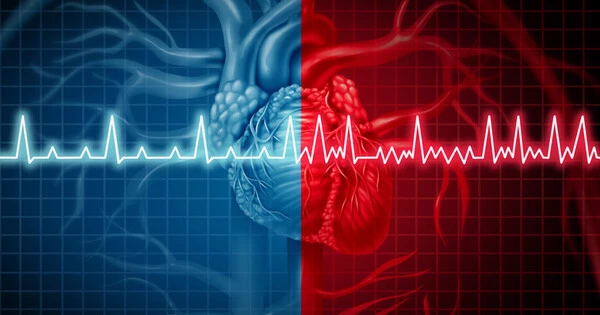Stress and insomnia can cause abnormal heart rhythms, especially in postmenopausal women. This link is significant because abnormal heartbeats, often known as arrhythmias, raise the risk of cardiovascular disease and other health concerns.
More than 25% of women aged 50 to 79 in a survey of over 83,000 questionnaires acquired abnormal heart rhythms known as atrial fibrillation, which may increase their risk of stroke and heart failure.
According to new research published today in the Journal of the American Heart Association, an estimated one in four women may develop irregular heart rhythms – known as atrial fibrillation – in their lifetime after menopause, with stressful life events and insomnia being major contributing factors.
Blood clots, stroke, heart failure, and other cardiovascular problems can result from atrial fibrillation. According to the American Heart Association, more than 12 million people in the United States are predicted to develop atrial fibrillation by 2030.
The heart and brain connection has been long established in many conditions. Atrial fibrillation is a disease of the electrical conduction system and is prone to hormonal changes stemming from stress and poor sleep. These common pathways likely underpin the association between stress and insomnia with atrial fibrillation.
Susan X. Zhao
“In my general cardiology practice, I see many postmenopausal women with picture-perfect physical health who struggle with poor sleep and negative psychological emotional feelings or experiences, which we now know may put them at risk for developing atrial fibrillation,” said lead study author Susan X. Zhao, M.D., a cardiologist at Santa Clara Valley Medical Center in San Jose, California. “I strongly believe that in addition to age, genetic and other heart-health related risk factors, psychosocial factors are the missing piece to the puzzle of the genesis of atrial fibrillation.”
Researchers examined data from the Women’s Health Initiative, a large U.S. study, which included more than 83,000 surveys completed by women aged 50 to 79. Participants were presented with a series of questions divided into four categories: stressful life events, optimism, social support, and insomnia. Loss of a loved one, illness, divorce, financial hardship, and domestic, verbal, physical, or sexual abuse were among the issues addressed in questions about stressful life events.
Questions about sleeping habits included whether individuals had difficulty falling asleep, waking up multiple times during the night, and general sleep quality. Having friends to talk with during and about tough or stressful times; a sense of optimism, such as believing good things are on the horizon; and having help with daily chores were all addressed in questions about participants’ views on life and social supports.

During approximately a decade of follow-up, the study found:
- About 25% or 23,954 women developed atrial fibrillation.
- A two-cluster system (the stress cluster and the strain cluster).
- For each additional point on the insomnia scale, there is a 4% higher likelihood of developing atrial fibrillation. Similarly, for each additional point on the stressful life event scale, there is a 2% higher likelihood of having atrial fibrillation.
“The heart and brain connection has been long established in many conditions,” Zhao said. “Atrial fibrillation is a disease of the electrical conduction system and is prone to hormonal changes stemming from stress and poor sleep. These common pathways likely underpin the association between stress and insomnia with atrial fibrillation.”
Researchers discovered a link between stressful life events, poor sleep, and symptoms like despair, anxiety, or feeling overwhelmed by one’s surroundings. It’s unclear whether these factors aggregate gradually over time to increase the incidence of atrial fibrillation in women as they get older.
Chronic stress has not been reliably linked to atrial fibrillation, and the researchers acknowledge that one drawback of their study is that it relied on patient questionnaires at the outset. Stressful life situations, however substantial and traumatic, may not last, according to Zhao. More study is needed to validate these correlations and determine whether individualized stress-relief strategies can reduce the incidence of atrial fibrillation.
Study details and background:
- Participants were recruited between 1994 and 1998.
- The study’s 83,736 female participants had an average age of 64 years. Approximately 88% of the women in the study self-identified as white, 7.2% as Black women, and 2.9% as Hispanic women.
- As women live longer lives, they may face a higher risk of atrial fibrillation and poorer results. While high blood pressure, obesity, Type 2 diabetes, and heart failure are known risk factors, additional research is needed to determine how psychosocial stress and overall emotional well-being affect the development of atrial fibrillation over time.
















